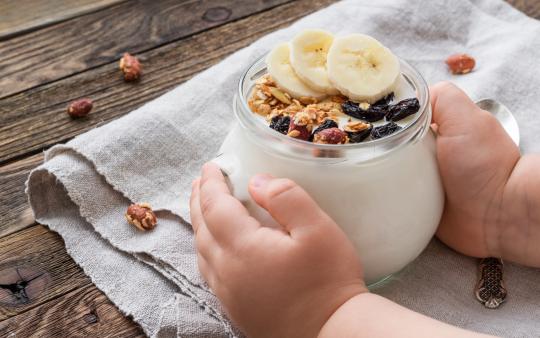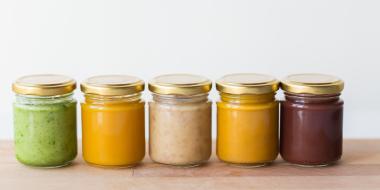How can you figure out if it’s time to start solids and what is the best baby food diet for your little one’s gut flora? There are a lot of conflicting messages flying around about when to start and what to start with in order to give your child the best health advantages. One certain thing is that the best baby food diets will contain nutrients that support baby's microbiome and consequently their immune system. Fortunately, there are many options that babies love!
Before you transition baby to a solid food diet
Current Health Canada and USDA guidelines suggest starting solids no earlier than 4 months and no later than 7 months. Introducing potentially allergy-provoking foods earlier than traditionally recommended is now being suggested to give them the best chance of avoiding allergy. However, each child is unique and by tuning in to their needs and asking a few key questions, you can determine the best baby food diet to start them on and when.
1. Are baby's digestion and motor skills ready?
With little direct evidence for the best time to transition to solid food, we only have a best guess based on what experts know about typical development and health outcomes. Current research suggests that the digestive system of most babies becomes mature enough to digest solids between 4 and 8 months of age.
Some signs to suggest a baby food diet can include solids are:
- They express interest in food and are ready and willing to chew
- They accept food without pushing it out with their tongue
- Their first few teeth are starting to poke through
- They can sit up unassisted
- Early skin conditions, constipation, and reflux have cleared up
If your child had reflux, colic, skin conditions, or persistent constipation or diarrhea as an infant, it’s more likely that they will struggle to digest certain foods later on. Getting support to resolve these digestive-related issues first can make the transition to solids more seamless.
2. How can you meet your child’s changing nutritional needs?
Some studies suggest that while the nutritional quality of breast milk is perfect for infants, by the time baby is about six months old it struggles to keep up with their expanding nutritional needs. This makes six months an appropriate time to start offering easy-to-digest, nutrient dense foods like fruits, vegetables, and healthy fats to accompany the amazing health-enhancing properties of breast milk and to maintain baby’s gut flora.
Most health agencies now agree that a baby will get the most health benefits from being exclusively breastfed for six months, at which point complementary foods can be added. For parents who are using formula, I often suggest carefully starting a baby food diet of solids a bit earlier because healthy whole foods expand your ability to nourish your baby’s immune system.
3. How can you support your child’s immune system development?
Researchers learned recently that our body’s most densely populated area of immune cells is in our gut lining. Since one in two adults struggle with an immune-related health condition, this discovery spawned a huge interest in understanding how we can influence the immune system by focusing on the health of the gut.
Currently, we know that poor mucosal integrity along with a lack of microbial diversity contribute to the development of immune-related conditions like asthma, eczema, allergy, and autoimmune disease. Furthermore, it seems that the first two years of life represent a programming period for our gut ecosystem—a time where our microbes organize themselves and settle into a pattern that might persist throughout our lives. This theory has become known as “microbial programming”. Wild! These good bacteria, or gut flora, need our love and attention right from the start, and there are easy ways for building baby's belly bacteria once you introduce an expanded baby food diet.
6 ways to build your baby’s microbiome through diet
- Start with fruits and vegetables like banana and pumpkin. Fruits and vegetables provide fibre, which helps those microbes grow healthy and colonize.
- Offer your baby fermented vegetables like fermented carrots and cucumbers to introduce more beneficial bacteria. You can give these to your baby to suck on after 7 months of age, once hydrochloric acid levels in the stomach stabilize.
- Kefir, a fermented dairy product, can be introduced once your child is ready for dairy, around 7-9 months. This will provide even more beneficial bacteria and yeast. Keep in mind that fermented dairy is easier to digest than milk so it may be started earlier than whole milk, which may be better introduced around 12 months.
- Broth made by simmering animal meat/bones offers an easy-to-digest form of protein, essential minerals, gelatin, and the amino acids glycine and glutamine. These nourish the digestive lining so that the gut flora has a healthy place to colonize. Broth can be offered as early as 5 months as it is very easy to digest.
- A good quality probiotic supplement for babies can be helpful, particularly if birth was via caesarean, you are using formula, you used antibiotics during birth, or you have a history of family immune, neurological, or gastrointestinal-related illness. Probiotics have been shown to be a safe and effective way to reduce the risk of allergy and asthma by up to 54%.
- Use coconut oil and coconut milk. This healthy tropical oil contains fatty acids which help nourish the digestive lining, keep pathogenic microbes at bay and support immune cell functioning. Melt it and mix it into purees, soups and smoothies, and use it to sauté fun finger foods when they’re older.
Our understanding of how and when we should transition our babies to solids is still evolving. What is clear is that early childhood nutrition plays an important role in the development of health and disease later in life. Consider the six ways to enhance a baby food diet outlined here to support digestive and immune function for a solid start!







